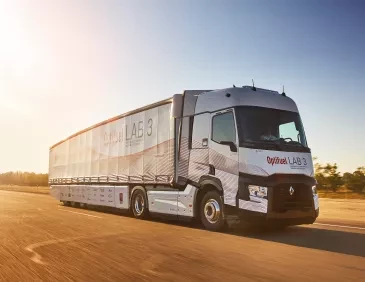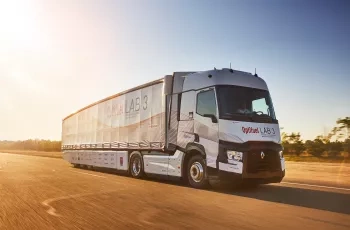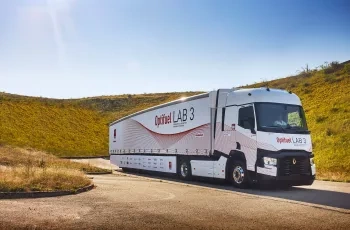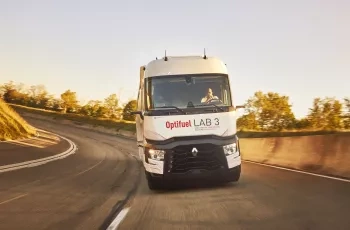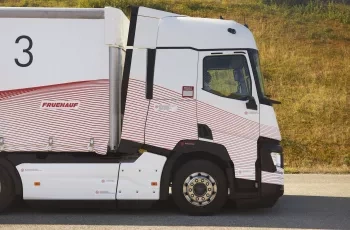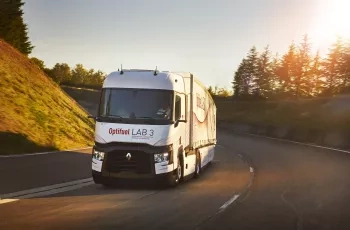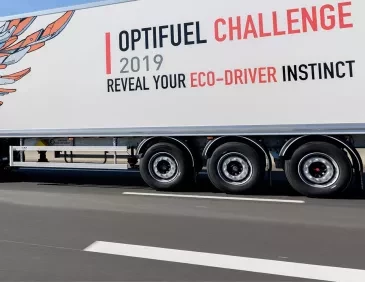Press release - 18 May 2021
ENERGY EFFICIENCY: OPTIFUEL LAB 3 REDUCES FUEL CONSUMPTION BY 12.5%
Renault Trucks has unveiled the results of Optifuel Lab 3. The manufacturer's long-distance laboratory vehicle has recorded a 12.5% reduction in fuel consumption compared to a standard coupling. This result was achieved by optimising the aerodynamics of the full convoy, powertrain and tyres, and by integrating predictive driving support and energy management functions.
Renault Trucks is continuing its research to improve the energy efficiency of its trucks. Initiated in 2017, the FALCON project, Flexible & Aerodynamic truck for Low CONsumption, set out to reduce consumption by 13% on a complete heavy-duty tractor trailer combination. It was led by Renault Trucks with a consortium of partners including Faurecia, Michelin, Total, Fruehauf, Wezzoo, BeNomad, Styl'Monde, Polyrim, Enogia, IFPEN, the École Centrale de Lyon (LMFA) and IFSTTAR, which is now the Université Gustave Eiffel. It received public fundings from the French Public Investment Bank BPI France (23rd F.U.I. call for projects) and European Regional Development Fund (ERDF).
This project produced the Optifuel Lab 3 laboratory vehicle. After 18 months of development, 6 months of tests on tracks and open roads and 15,500 kilometres, Renault Trucks has been able to confirm its assumptions. The manufacturer has measured a 12.5% reduction in fuel consumption compared with the Renault Trucks T series coupled to a standard trailer. This represents a saving of 3.75 litres of fuel and 9.8 kg of CO2 per 100 km.
Test cycle
Renault Trucks engineers used a test cycle statistically representative of long-distance use, consisting of 68 km in regional conditions and 136 km on motorways.
The tests with Optifuel Lab 3 consisted of closed tracks and open road tests, in addition to simulations which allowed the measurements to be analysed and correlated. In parallel, tests were carried out with a reference vehicle with similar geometrical and powertrain characteristics to the laboratory vehicle (Renault Trucks T 480, coupled with a Fruehauf covered semi-trailer). The technologies developed under the project were evaluated first independently and then as a whole.
The powertrains of the Optifuel Lab 3 and reference vehicles were run in beforehand, to ensure both vehicles were representative.
Measurement methods
Evaluation of aerodynamic gain
The air drag gain was evaluated using the official CO2 regulation procedure. Wheel torque was measured at two constant speeds: low speed (~15 km/h) and high speed (~90 km/h) following the test sequence defined by the European Commission.
This procedure was used to evaluate the contribution to the aerodynamic gain of the tractor alone and then of the complete Optifuel Lab 3 combination.
The air drag gains were then converted into fuel consumption gains by simulations on the representative customer cycle defined in the project, before being confirmed by open roads tests.
Gains from connected low rolling resistance tyres
The rolling resistance improvements of the tyres developed for Optifuel Lab 3 were measured by Michelin according to the ISO 28580 standard. The tyre is compressed under a load corresponding to 85% of the load index of the tyre, on a roller with an equivalent diameter of 2 m and in an enclosure where the temperature is maintained at 25°C. The drag force generated by the tyre is measured at a speed of 80 km/h after 3 hours of stabilised thermal regime.
Powertrain: gains from low viscosity lubricants and Rankine heat recovery system
Low-viscosity lubricants for the engine, gearbox and axle, developed with Total, reduced fuel consumption in the powertrain. The corresponding gains were measured on the engine test bench and on component test benches.
At the same time, it was confirmed that these new generation lubricants did not cause premature wear of components, in particular thanks to use of Thin Layer Activation (TLA).
Finally, as regards the Rankine heat recovery system, fuel consumption savings were evaluated on a component bench in cooperation with the University of Liège. Two different architectures were compared (exhaust and cooling circuit recovery) and various refrigerant fluids were evaluated as part of this test campaign.
Gains from the integration of predictive driving support and energy management functions
The predictive driving support and energy management functions were evaluated under real driving conditions on a representative customer cycle.
The new optimised adaptive cruise control strategies using BeNomad navigation data, the smart alternator control strategy and the new cooling system actuators were tested and compared with the strategies and actuators used by the serial production vehicle.
The FALCON project has confirmed the effectiveness of the technologies used to achieve the goal of reducing fuel consumption. Work on laboratory vehicles is enabling Renault Trucks to prepare the technical solutions for its future products, in particular to meet the requirements of European regulations on CO2 emissions for heavy vehicles, mass and dimensions, and tyres.
Although Optifuel Lab 3 is not destined to be marketed in this form, the most effective technologies could be incorporated into serial production trucks.
Press contact
Phone : +33 4 81 93 09 52
E-mail : severyne.molard@renault-trucks.com

